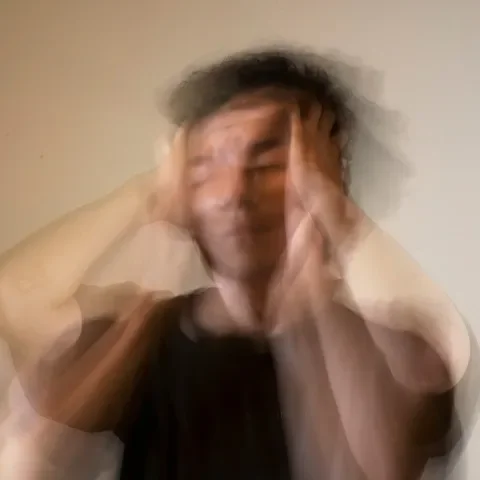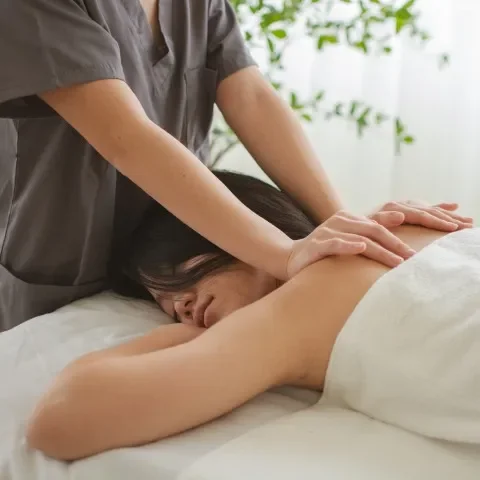Massage for Anxiety Relief: Here’s What to Know
Key Takeaways:
Physical and Emotional Relief: Massage therapy may support anxiety management by promoting relaxation and easing physical tension.
Safe and Supportive Environment: PRESS offers a trauma-informed, inclusive environment designed to support emotional and physical wellness.
Holistic Mental Health Support: Regular massage sessions can complement other mental health practices, creating a holistic path toward anxiety management.
Anxiety doesn’t just affect your thoughts; it shows up in your body, too. Tight shoulders, shallow breathing, and constant tension are just a few ways anxiety physically manifests. Massage can help by giving your body the reset it needs.
In this piece, we’ll explore how massage therapy helps with anxiety, the techniques that work best, and why PRESS is the go-to studio for relief that goes deeper than relaxation.
What Is Anxiety and How Does It Affect the Body?
Anxiety is a natural response to stress, but when it becomes chronic, it can affect both the mind and the body in profound ways. People experiencing anxiety often report persistent worry, racing thoughts, or a sense of dread — even when there’s no clear threat. But anxiety doesn’t just stay in the mind; it also manifests physically.
When the body is under stress, it triggers a "fight-or-flight" response. This leads to increased heart rate, shallow breathing, muscle tension, and the release of stress hormones like cortisol. Over time, chronic anxiety can cause headaches, digestive issues, fatigue, and even chronic pain due to continuous muscle tension.
How Massage Therapy Helps Relieve Anxiety
Massage therapy offers more than just physical relaxation. It may help the body manage stress and encourage a sense of balance. When receiving a massage, the body shifts from a state of heightened alertness (sympathetic nervous system dominance) to a more restful state (parasympathetic nervous system dominance). This shift is believed to promote a calmer state, which may contribute to lowered heart rate, blood pressure, and cortisol levels..
A commonly noted benefit of massage for those experiencing anxiety is that it may help ease muscle tension. Anxiety often leads to chronic muscle tightness, especially in areas like the shoulders, neck, and back. Massage therapists use targeted techniques to ease these tensions, allowing both physical and emotional stress to release.
In addition to physical effects, massage is believed to stimulate the release of feel-good neurotransmitters like serotonin and dopamine, which may enhance overall mood. These chemicals help regulate mood and promote a sense of well-being. For many people, regular massage may complement their anxiety management routine — offering support for both body and mind in a holistic, non-invasive way.
Types of Massage Techniques for Anxiety
Different massage techniques can support anxiety relief, each with unique approaches and benefits. The choice often depends on individual preference and how anxiety shows up in the body.
Swedish Massage
This is one of the most popular techniques for relaxation. It uses long, gentle strokes, kneading, and circular movements to promote full-body relaxation. Swedish massage is especially effective for calming the nervous system and easing general tension.
Deep Tissue Massage
While more intense than Swedish, deep tissue massage targets chronic muscle tension and stress held deep in the body. It’s helpful for people whose anxiety manifests as physical pain or stiffness, particularly in the shoulders, neck, or back.
Trigger Point Therapy
This method focuses on tight “knots” in the muscle tissue that can cause discomfort or limit mobility. By applying pressure to these trigger points, massage therapists can help release built-up tension and improve circulation — contributing to an overall sense of relief.
Integrative Techniques
Studios like PRESS may incorporate elements from various styles based on your specific needs. Our team is trained to tailor each session to how you’re feeling that day — making sure your experience is aligned with your body’s stress levels and comfort zone.
What to Expect During an Anxiety-Relief Massage
If you’ve never had a massage before, especially one focused on anxiety relief, it’s normal to feel unsure about what to expect. The good news? The process is designed to be calming from start to finish.
When you arrive at a massage studio like PRESS, you’ll typically begin with a short intake where your therapist asks about your physical tension, emotional stress levels, and any areas you’d like to focus on or avoid. This helps them personalize the session to your current needs — whether you’re looking for deep pressure, gentle relaxation, or a mix of both.
The massage room is a low-distraction, soothing environment, often with soft lighting and calming music. Your therapist will check in with you during the session to make sure you’re comfortable, both physically and emotionally. You’re encouraged to speak up at any time, whether it’s about the pressure, temperature, or how you’re feeling.
By the end of the session, many people report feeling lighter, more grounded, and emotionally reset. Regular sessions can help build a sense of safety and routine that’s especially helpful for those managing chronic anxiety.
Why PRESS Is a Great Option
When looking for a massage studio that understands the nuances of anxiety relief, PRESS stands out as a trusted and thoughtful choice. Our approach blends therapeutic skill with emotional awareness, creating a space where clients can truly relax and reset.
What sets PRESS apart is our commitment to body-positive, inclusive care. Every session is customized based on your body’s unique stress responses and needs that day, rather than a one-size-fits-all approach. Our licensed massage therapists are trained not only in technique, but also in trauma-informed practices that support mental wellness and emotional safety.
PRESS also avoids the sterile or overly clinical feel some wellness spaces have. Instead, they offer an environment that’s warm, welcoming, and professional — perfect for those seeking regular anxiety support in a place that feels genuinely caring.
If you’re looking for a massage studio that takes mental health as seriously as physical comfort, PRESS delivers on both.
Final Thoughts
Anxiety is a whole-body experience — and managing it effectively often requires more than just mental strategies. Massage therapy may offer a supportive approach to addressing the physical symptoms of anxiety, such as muscle tension and restlessness, and may promote emotional ease.
Whether you're feeling overwhelmed by day-to-day stress or navigating chronic anxiety, incorporating massage into your self-care routine can offer meaningful relief. Studios like PRESS provide a supportive, inclusive environment where you can reconnect with your body and mind in a safe and empowering way.
Ready to take the first step toward greater calm? Book your session at PRESS today and discover how good it can feel to truly let go.
Read also:
Frequently Asked Questions About Massage for Anxiety Relief
Is massage therapy a long-term solution for anxiety?
Massage is a supportive tool rather than a cure. While it can potentially help with anxiety symptoms in the short term, long-term management often benefits from a combination of therapies including counseling, lifestyle changes, and medical support when necessary.
How often should I get a massage for anxiety relief?
Frequency depends on your individual needs and stress levels. Some people benefit from weekly sessions, while others find biweekly or monthly visits effective for maintaining emotional balance.
Can massage therapy replace medication for anxiety?
Massage should not replace prescribed medications unless advised by a healthcare provider. However, it can serve as a complementary therapy to enhance overall emotional and physical wellness.
Are there any risks associated with massage for anxiety?
Massage is generally safe, but individuals with certain conditions like PTSD, sensory sensitivities, or touch-related trauma should ensure their therapist is trained in trauma-informed care, like our team at PRESS.
Will I feel emotional during or after a massage session?
Yes, it’s possible to feel emotional during a session. Massage can release stored tension and emotional energy, sometimes leading to feelings of sadness, joy, or relief. This is a normal and healthy part of the healing process.
Does massage therapy help with sleep issues caused by anxiety?
Yes, massage has the potential to help with sleep issues. By reducing stress hormones and encouraging relaxation, massage may support relaxation and help improve sleep quality, particularly for individuals whose rest is affected by stress or anxiety.
Is it okay to talk during a massage?
Absolutely! Some clients find talking helps them relax, while others prefer silence. Communication with your chosen therapist is always encouraged to ensure comfort.
Can massage therapy help children or teens with anxiety?
Yes, but it should always be age-appropriate and administered by a licensed therapist trained in working with younger clients. Always consult a pediatrician beforehand.
What should I wear to a massage appointment?
Wear whatever makes you feel comfortable. If you don’t have time to change, feel free to come in your work clothes or workout gear. You'll be draped professionally during the session, and your comfort and modesty will always be respected.


